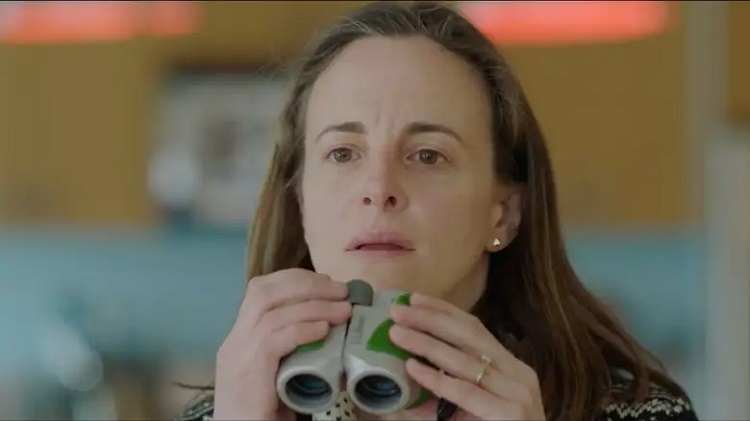
Written by Ram Venkat Srikar
I love it when films tell a thing or two about life, smoothly sharing a message into our subconscious. Especially anything that makes me feel good and appreciates little things in life which we, in general, take for granted. Marshalll Curry’s The Neighbor’s Window is one such bitter-sweet story that’s coated with multiple themes like urban loneliness, individuality, marital life, and the way we perceive other’s lives. The emphasis is on the last point. Here, the leads, Alli (Maria Dizzia, terrific) and Jacob (Greg Keller, equally good), a couple on the beginning of mid-life crisis, literally peek into the window of the house across the street facing theirs. The opening scene has Alli clearing the mess her kids have made when Jacob walks out of the bedroom and announces he has put the children to bed. There is a sense of accomplishment, even though it is presented for quirk. The couple discovers and stares at the young couple indulging in physical intimacy through the window.
The scene itself plays like a comedy when they sit down with a clear view taking a sneak at the young couple. It’s almost like they are watching a TV show. And the scene sets out the arcs of the characters and the direction the film will be taking. Although It might appear as an act of voyeurism, it is that Alli and Jacob find their own younger selves in their neighbors. And the regret of ageing is evident, even though it’s helpless. Dialogues spoken out aloud about their ages and the way their life has changed over the years had me thinking about Noah Baumbach’s When We’re Young. On the surface, we have two films where protagonists share a mindset in common. Both beautiful films, but The Neighbor’s Window is a bigger cinematic achievement respecting what it does in that little span. Beyond the age and mid-life crisis, this little film passes on a beautiful message to cherish life. What you have could be a dream for someone. Life-altering, it can be for some.
The first 10 minutes have regret and dissatisfaction wafting through them with the usage of “Nobody Else Will Be There” by The National in the background reflecting Alli’s state of mind, playing. It’s like there is an anticipation in the atmosphere for a life-altering moment, and when it happens, silence fills the atmosphere. Because there isn’t anything, Alli can do other than being aa witness and accepting. There’s also a subtle commentary on lonely can someone be in of the most crowded cities in the world, New York. We see the city in different seasons. While the physicality varies, the mentality remains constant.
The accomplishment of the film lies in how many emotions it packs in 20 minutes, giving us fully fleshed out characters. Throughout the runtime, the filmmaker doesn’t force you to read the subtext. If you notice, great. Else, you still a little film with a huge heart.
On January 29, ShortsTV will debut THE 2020 OSCAR NOMINATED SHORT FILMS at the IFC Center in New York City and in select markets, and then roll out across the US and Europe on January 31. This marks the 15th consecutive year of the Oscar Nominated Short Films theatrical experience. It is the only opportunity for audiences to watch the short film nominees in theaters before the Academy Awards ceremony on Sunday February 9, 2020. They will also made available via on demand platforms, including iTunes, Amazon Instant Video, Google Play and Vimeo on Demand. The release ensures the greatest number of viewers can see all the nominees before the ceremony, while providing short filmmakers with an unprecedented opportunity to commercialise their movies. Each nominee is released in one of three distinct feature-length compilations according to their category of nomination: Live Action, Animation, or Documentary.